Earlier, Iran missed out on the gold at 55kg when world U20 champion Payam AHMADI (IRI) fell to Vakhtang LOLUA (GEO) 9-7 in a thrilling final.
The 18-year-old Lolua, who himself won a bronze medal at 60kg from last month's World U20 Championships, got a turn from par terre in the first period to lead 3-0. But the par terre in the second period saw 10 points scored.
As Ahmadi got the position, it made the score 3-1. He went for the front head lock instead of the preferred gut-wrench and managed to turn Lolua three times to rack up six points, while Lolua blocked him once from the headpinch to earn two points.
When the referees called it neutral, Ahmadi led 7-5 and just 1:52 away from winning a senior world title. However, a third passivity was called by the officials, putting Ahmadi down in par terre.
Lolua made the most of that and used a chestwrap to turn Ahmadi for two points. He then lifted Ahmadi and completed a correct throw for a 9-7 lead with 34 seconds left. Lolua defended the lead without any trouble to win the gold.
"I had prepared well. This was my first time competing at the World Championships, and this year I became a world champion," Lolua said. "The clock never stops, and everyone dreams of becoming a world champion -- now that dream has come true."
The teenager, who has already won a European Championships medal, said he came to Zagreb to fight with all his grit.
"I don't even know what to say -- I feel so many emotions, and it's hard to describe everything," he said. "I came here to fight. Everyone came out to support me. What matters most is that, first of all, you must fight with your own strength and determination."
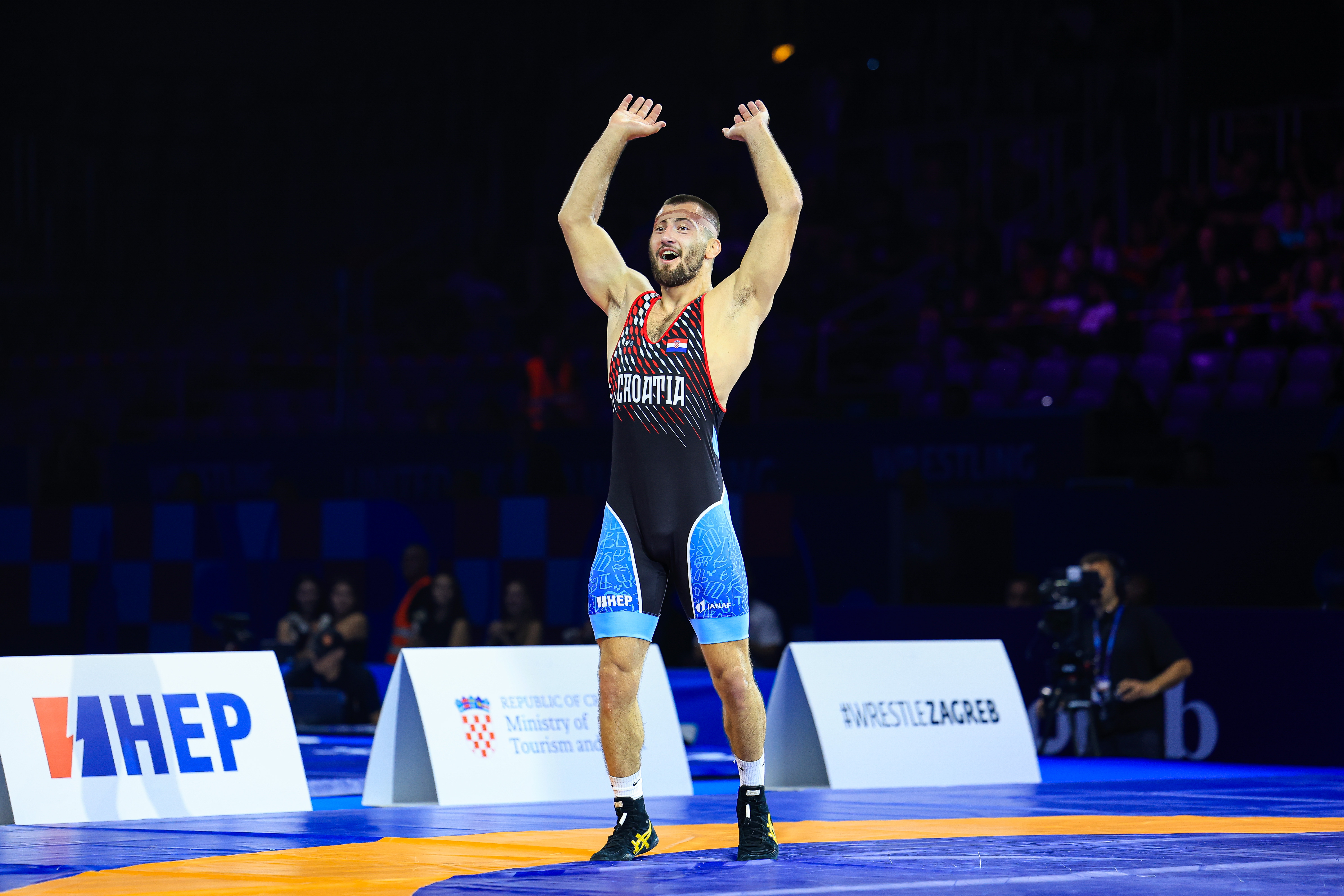 Karlo KODRIC (CRO) celebrates with home fans after winning Croatia's first world medal since 2014. (Photo: United World Wrestling / Kadir Caliskan)
Karlo KODRIC (CRO) celebrates with home fans after winning Croatia's first world medal since 2014. (Photo: United World Wrestling / Kadir Caliskan)
Host Croatia, Finland end medal droughts
Host Croatia ended a decade-long drought for a World Championships medal when Karlo KODRIC (CRO) won the bronze medal at 82kg with a 5-0 victory over Ramon BETSCHART (SUI).
Kodric became only the third world medalist for Croatia after brothers Neven and Nenad ZUGAJ (CRO). Neven won silver in 2014 and bronze in 2011 while Nenad won bronze in 2010.
Kodric got both par terre positions in the match. While he failed to score in the first period, he scored two points via forward exposure instead of rolling Betschart. The Switzerland corner challenged the call, but it was upheld and Kodric got one more point for the lost challenge to win 5-0.
"It's the best feeling in the world," Kodric said. "Before the match, I felt a lot of pressure. It's the biggest I've ever felt. But I beat him. This is all I do, training and thinking of every medal possible to take. That is all my life."
The second bronze at 82kg went to Taizo YOSHIDA (JPN), a month after he won bronze at the World U20 Championships, by rallying to edge Adlet TIULIUBAEV (UWW) 3-3.
Yoshida gave up a turn from par terre and fell 3-0 behind at the break, and was in further trouble when he failed to score from par terre in the second period. But he powered his way to a takedown with 45 seconds left when he dragged Tiuliubaev and quickly got behind for two points, giving him a 3-3 criteria lead to win the bronze medal.
At 19 years 4 months and 24 days, Yoshida became the youngest Japanese male wrestler to win a medal at the World Championships. Before Yoshida, it was Yuji TAKADA (JPN) who won bronze at the 1973 World Championships in Freestyle 52kg at the age of 19 years 6 months and 20 days.
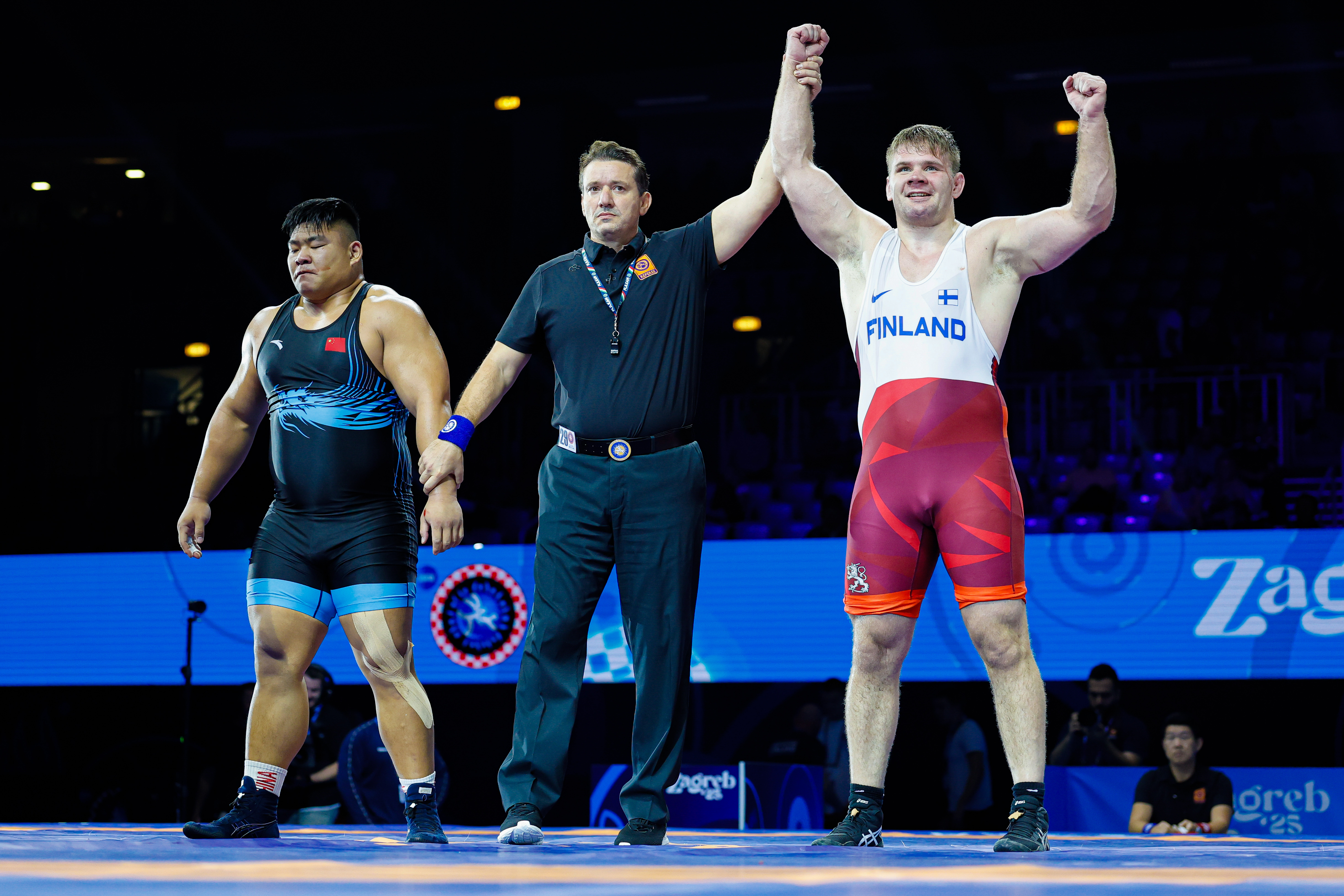 Elias KUOSMANEN (FIN) wins the bronze medal bout against Wenhao JIANG (CHN). (Photo: United World Wrestling / Kostadin Andonov)
Elias KUOSMANEN (FIN) wins the bronze medal bout against Wenhao JIANG (CHN). (Photo: United World Wrestling / Kostadin Andonov)
Another country that ended a medal drought at the World Championships was Finland, as Elias KUOSMANEN (FIN) scored a late stepout to beat Wenhao JIANG (CHN) 3-3. It was Finland's first medal since 2011, when Rami HIETANIEMI (FIN) won bronze at 84kg.
Kousmanen led 1-1 on criteria thanks to an early stepout. His lead became 2-1 when he got the par terre position in the second period. But he failed to completely turn Jiang from par terre and gave up a stepout to fall behind 2-2 on criteria, and then lost the challenge to give one more point to Jiang.
Kousmanen, however, kept the pressure on and managed to get a stepout with 33 seconds left in the match. He defended his 3-3 criteria lead to win bronze, a first for Finland in any weight class above 90kg.
Pavel HLINCHUK (UWW) won a bronze medal at 130kg after he rolled to a 9-1 technical superiority win over Mykola KUCHMII (UKR). Hlinchuk, a world U23 champion at 97kg, jumped to 130kg last year and despite being only 110kg, managed to win a medal in the heaviest weight class.
At 77kg, Robert FRITSCH (HUN) upset Paris silver medalist Demeu ZHADRAYEV (KAZ), 6-5, to capture the bronze medal.
Fritsch trailed 5-0 at the break but launched a big four at the start of the second period to make it 5-4. A stepout made it 5-5 with Fritsch leading on criteria before he got the par terre which put him ahead 6-5.
Turkiye finally won its first medal of the World Championships from a male wrestler when Ahmet YILMAZ (TUR) defeated world U20 champion Alireza ABDEVALI (IRI) 6-3 for the the other 77kg bronze.
Four-time world champion Eldaniz AZIZLI (AZE) returned to win a bronze medal at 55kg by beating Ulan MURATBEK UULU (KGZ), 9-0, using turns from par terre to win his seventh world medal overall.
The other bronze went to China as Huoying SHI (CHN) used the third passivity to score two turns on Emin CAKIR (TUR) for a 5-1 win.
Day 7 Results
Greco-Roman
55kg (18 entries)
GOLD: Vakhtang LOLUA (GEO) df. Payam AHMADI (IRI), 9-7
BRONZE: Huoying SHI (CHN) df. Emin CAKIR (TUR), 5-1
BRONZE: Eldaniz AZIZLI (AZE) df. Ulan MURATBEK UULU (KGZ) by TF, 9-0, 1:53
60kg (25 entries)
SEMIFINAL: Aidos SULTANGALI (KAZ) df. Amiran SHAVADZE (GEO) by TF, 10-2, 5:57
SEMIFINAL: Alisher GANIEV (UZB) df. Georgij TIBILOV (SRB), 5-5
72kg (30 entries)
SEMIFINAL: Ulvu GANIZADE (AZE) df. Abdullo ALIEV (UZB), 5-0
SEMIFINAL: Ibrahim GHANEM (FRA) df. Merey MAULITKANOV (KAZ) by Fall, 5:49 (7-2)
77kg (33 entries)
GOLD: Malkhas AMOYAN (ARM) df. Nao KUSAKA (JPN) by TF, 10-1, 4:23
BRONZE: Ahmet YILMAZ (TUR) df. Alireza ABDEVALI (IRI), 6-3
BRONZE: Robert FRITSCH (HUN) df. Demeu ZHADRAYEV (KAZ), 6-5
82kg (26 entries)
GOLD: Gholamreza FAROKHI (IRI) df. Gela BOLKVADZE (GEO), 4-0
BRONZE: Taizo YOSHIDA (JPN) df. Adlet TIULIUBAEV (UWW), 3-3
BRONZE: Karlo KODRIC (CRO) df. Ramon BETSCHART (SUI), 5-0
97kg (29 entries)
SEMIFINAL: Mohammadhadi SARAVI (IRI) df. Kiryl MASKEVICH (UWW), 3-1
SEMIFINAL: Artur SARGSIAN (UWW) df. Murad AHMADIYEV (AZE), 1-1
130kg (27 entries)
GOLD: Amin MIRZAZADEH (IRI) df. Darius VITEK (HUN), 7-2
BRONZE: Pavel HLINCHUK (UWW) df. Mykola KUCHMII (UKR) by TF, 9-1, 4:09
BRONZE: Elias KUOSMANEN (FIN) df. Wenhao JIANG (CHN), 3-3


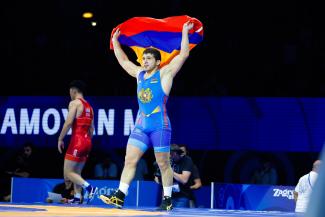
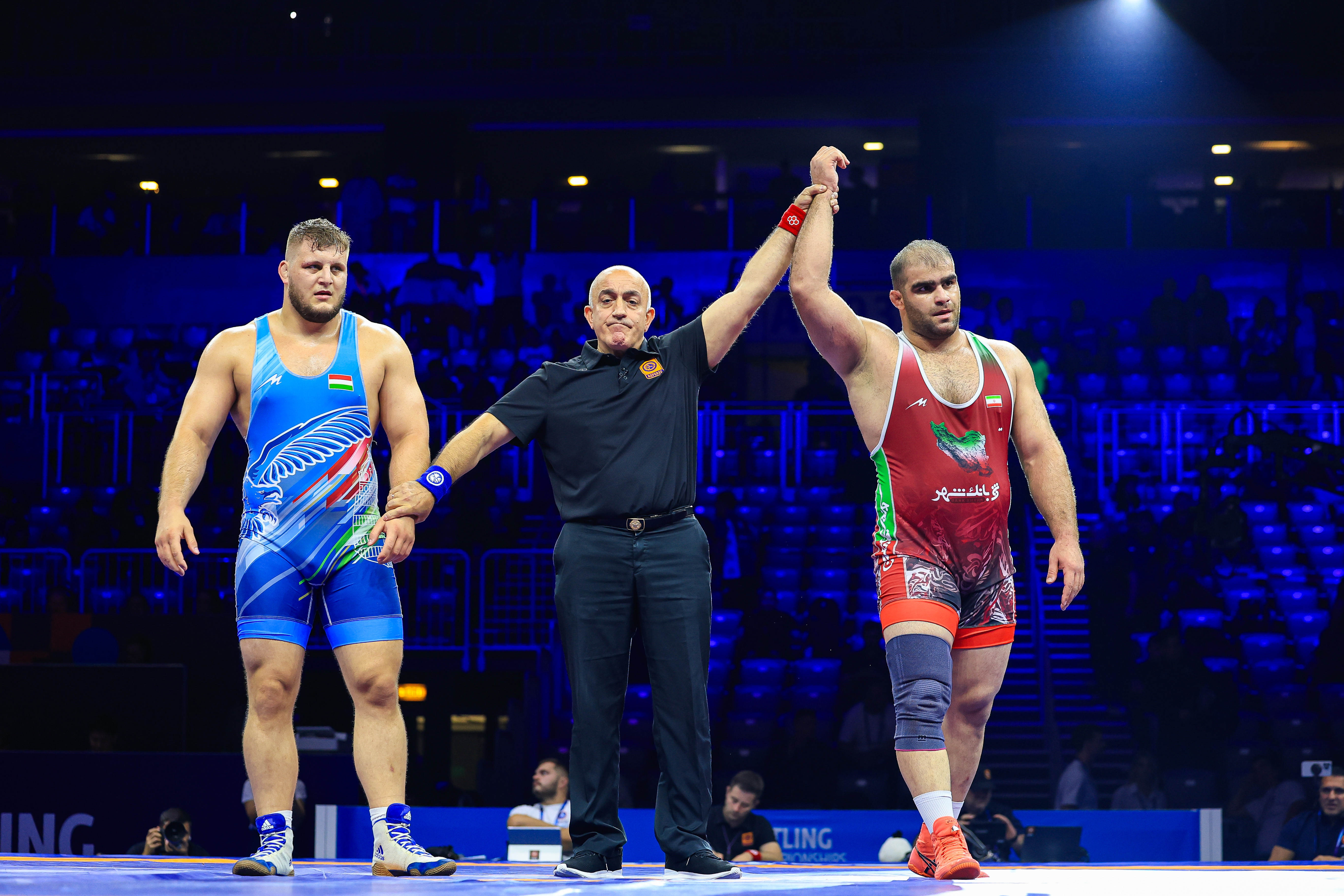 Amin MIRZAZADEH (IRI) is now a two-time world champion. (Photo: United World Wrestling / Kadir Caliskan)
Amin MIRZAZADEH (IRI) is now a two-time world champion. (Photo: United World Wrestling / Kadir Caliskan)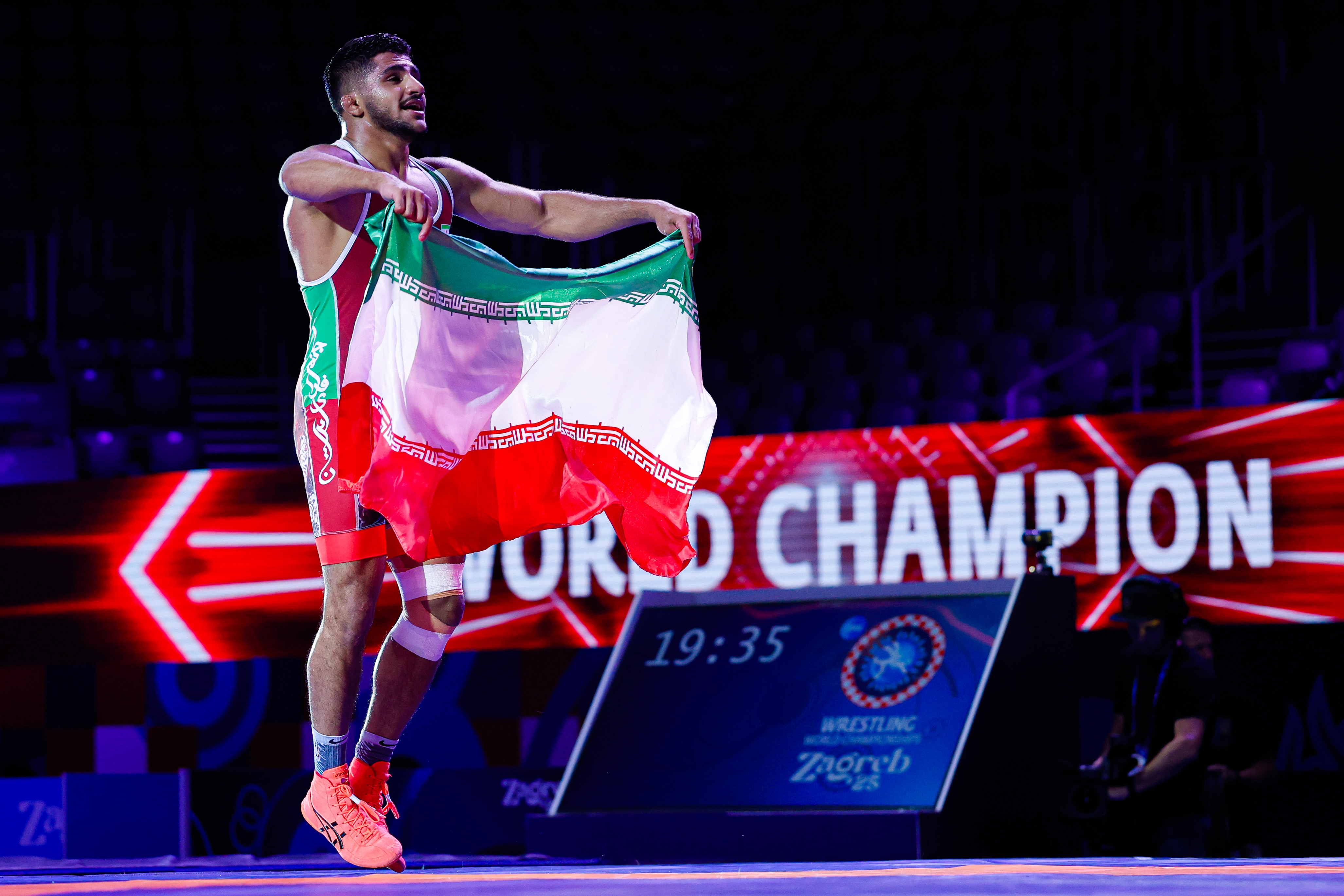 Gholamreza FAROKHI (IRI) celebrates after winning the 82kg final. (Photo: United World Wrestling / Kostadin Andonov)
Gholamreza FAROKHI (IRI) celebrates after winning the 82kg final. (Photo: United World Wrestling / Kostadin Andonov) Karlo KODRIC (CRO) celebrates with home fans after winning Croatia's first world medal since 2014. (Photo: United World Wrestling / Kadir Caliskan)
Karlo KODRIC (CRO) celebrates with home fans after winning Croatia's first world medal since 2014. (Photo: United World Wrestling / Kadir Caliskan) Elias KUOSMANEN (FIN) wins the bronze medal bout against Wenhao JIANG (CHN). (Photo: United World Wrestling / Kostadin Andonov)
Elias KUOSMANEN (FIN) wins the bronze medal bout against Wenhao JIANG (CHN). (Photo: United World Wrestling / Kostadin Andonov)
Share your thoughts.
Comments